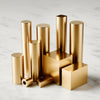How to Find a Reliable CNC Machine Shop: An Essential Guide

TL;DR
Finding a reliable CNC machine shop involves a structured evaluation of their technical capabilities, quality control systems, and industry experience. The key is to look beyond the initial price quote and assess their equipment, verify certifications like ISO 9001, and confirm their expertise with your specific materials and project complexity. A thorough vetting process, starting with a detailed Request for Quote (RFQ), is essential for establishing a successful partnership.
Key Evaluation Criteria for a Reliable CNC Machine Shop
Selecting the right CNC machine shop is a critical decision that directly impacts the quality, cost, and timeline of your project. A methodical approach to evaluating potential partners is necessary to ensure they can meet your specifications consistently. Focus on objective qualifications and proven expertise rather than choosing based solely on the lowest bid. A shop that offers greater value through quality and reliability will prevent costly rework and delays down the line.
Certifications and Quality Control
Quality certifications are a clear indicator of a shop's commitment to consistent, documented processes. According to Vescio Manufacturing, these credentials guarantee that a provider has proven its ability to deliver results. Look for internationally recognized standards that are relevant to your industry.
- ISO 9001:2015: This is the baseline certification for a quality management system. It ensures the shop has established processes for everything from quoting to final inspection, focusing on customer satisfaction and continual improvement.
- AS9100D: Essential for aerospace projects, this standard builds on ISO 9001 with additional requirements for quality and safety in the aviation, space, and defense industries.
- IATF 16949: For automotive projects, this certification is critical. It signifies that the shop adheres to the stringent quality demands of the automotive supply chain, as highlighted by RCO Engineering.
- ITAR Registration: For defense-related projects, ensure the shop is ITAR (International Traffic in Arms Regulations) registered to handle sensitive components and data securely.
Beyond certifications, inquire about their specific quality control equipment. A well-equipped shop will use tools like Coordinate Measuring Machines (CMMs) to verify that parts meet exact dimensional tolerances. Ask about their inspection protocols—do they perform in-process checks as well as final inspections?
Technical Capabilities and Equipment
A shop's equipment roster determines the complexity, precision, and efficiency of the work they can perform. You must ensure their technology aligns with your project's demands. A shop's machinery dictates the types of parts it can produce, from simple brackets to complex, multi-faceted components. As noted in a guide from CNCMachines.com, modern machinery ensures better accuracy and efficiency.
Key considerations include the types of CNC machines they operate (e.g., 3-axis, 4-axis, and 5-axis milling machines, lathes, Swiss machines, or wire EDM) and their proficiency with your required materials, whether they are standard aluminum and steel or advanced alloys and composites. For instance, a provider like XTJ CNC machining services demonstrates strong capabilities by offering advanced 4 and 5-axis machining for over 30 materials with tight tolerances down to +/- 0.005mm, which is crucial for demanding industries like aerospace and medical. This level of precision and material versatility is a hallmark of a highly capable partner.
Industry Experience and Expertise
Theoretical knowledge is no substitute for hands-on experience. A shop that has a proven track record in your industry will understand its unique challenges, standards, and material requirements. They can often provide valuable design for manufacturability (DFM) feedback that can improve your part's function and reduce production costs. When evaluating a shop, ask for a portfolio or case studies of projects similar to yours. This evidence demonstrates their ability to handle the specific complexities and materials your components require. A shop with deep industry expertise is more than a vendor; they are a strategic partner who can contribute to your project's success.
Effective Methods for Sourcing Potential Machine Shops
Once you know what to look for, the next step is to build a list of potential candidates. Finding the right shops to vet requires a multi-pronged approach that combines modern digital tools with traditional industry networking. A broad search will give you more options and a better chance of finding the perfect fit for your specific needs.
- Targeted Online Searches: Go beyond a simple "machine shop near me" search. Use specific keywords related to your needs, such as "5-axis CNC machining aerospace" or "ISO 9001 certified medical prototyping." This will help you filter out shops that don't have the specific capabilities you require. Online directories like ThomasNet or MFG.com can also be valuable resources for finding and comparing suppliers.
- Industry Directories and Trade Associations: Many industries have associations that maintain directories of qualified suppliers. These can be a source of pre-vetted, reputable shops that specialize in your field. Attending industry trade shows also provides an opportunity to meet with representatives from various shops in person and see their work firsthand.
- Referrals from Industry Peers: One of the most reliable methods is to ask for recommendations from trusted colleagues or contacts within your professional network. Insights from someone who has already worked with a shop can provide an honest assessment of their reliability, communication, and quality. Online forums and professional groups, such as those on LinkedIn or Reddit, can also be a source of candid feedback.
The Vetting Process: From RFQ to Final Selection
With a shortlist of potential shops, it's time to begin the formal vetting process. This stage moves from assessing capabilities on paper to evaluating their real-world performance, communication, and business practices. A structured approach will help you compare candidates objectively and make a confident final decision.
Step 1: Submit a Comprehensive Request for Quote (RFQ)
Your RFQ is the foundation of the vetting process. A detailed RFQ not only ensures you receive accurate quotes but also serves as your first test of a shop's professionalism and attention to detail. Be sure to include:
- Detailed 3D CAD models and 2D drawings.
- Material specifications and any required certifications.
- Required tolerances and surface finish callouts.
- Quantity needed (for both prototypes and production runs).
- Desired lead time and delivery date.
A thorough RFQ package allows the shop to provide a precise quote and demonstrates that you are a serious, well-prepared customer.
Step 2: Assess Communication and Responsiveness
Pay close attention to how each shop communicates throughout the quoting process. A reliable partner will be responsive, ask clarifying questions, and be transparent about their capabilities and lead times. Slow responses, vague answers, or a reluctance to provide detailed information are significant red flags. Good communication is essential for a smooth-running project, especially if design changes or unexpected issues arise.
Step 3: Compare Quotes, Lead Times, and Overall Value
When you receive quotes, avoid the temptation to simply choose the lowest price. As advised by experts at A & A Machine & Fabrication, a good shop will have a thorough quality assurance process, which contributes to the overall value. Analyze each quote to ensure it is complete and that there are no hidden costs. Compare the quoted lead times for realism. A quote that is significantly lower or faster than all others may indicate that the shop has misunderstood the project's complexity or is cutting corners on quality control. The best choice is the shop that offers the optimal balance of cost, quality, and delivery time.

Making Your Final Decision with Confidence
Choosing a reliable CNC machine shop is an investment in your project's success. By prioritizing proven quality, technical alignment, and clear communication, you establish a partnership built on trust and performance. The evaluation criteria and vetting process outlined here provide a robust framework for making an informed choice. Remember that the right partner does more than just make parts; they provide expertise, ensure quality, and contribute to a more efficient and successful manufacturing outcome. Taking the time to conduct a thorough search and evaluation will pay dividends in the long run, ensuring your components are made to specification, on time, and within budget.
Frequently Asked Questions
1. How do I find local machine shops?
Start with a targeted online search using terms like "CNC milling services in [your city]" or "local machine shops with ISO 9001 certification." Online directories such as ThomasNet, Yelp, and even Google Maps are excellent resources. Additionally, leverage your professional network by asking for recommendations from industry peers or joining local manufacturing and inventor groups who often have firsthand experience with reliable local suppliers.
2. What makes a CNC machine shop the 'best' choice for my project?
The "best" shop is the one that aligns most closely with your specific project requirements. This includes having the right equipment and technical capability to produce your parts, holding the necessary quality certifications for your industry (e.g., AS9100 for aerospace), and demonstrating direct experience with similar projects and materials. Strong communication, fair pricing, and the ability to meet your deadlines are also critical factors.
3. What are some red flags to watch for when choosing a shop?
Be cautious of shops that are poor communicators, provide vague or incomplete quotes, or are unwilling to share examples of past work or customer references. An unusually low price or an impossibly short lead time can also be a red flag, potentially indicating a misunderstanding of the project's scope or a compromise on quality. Finally, a disorganized or poorly maintained facility can be a sign of unprofessional operations.





